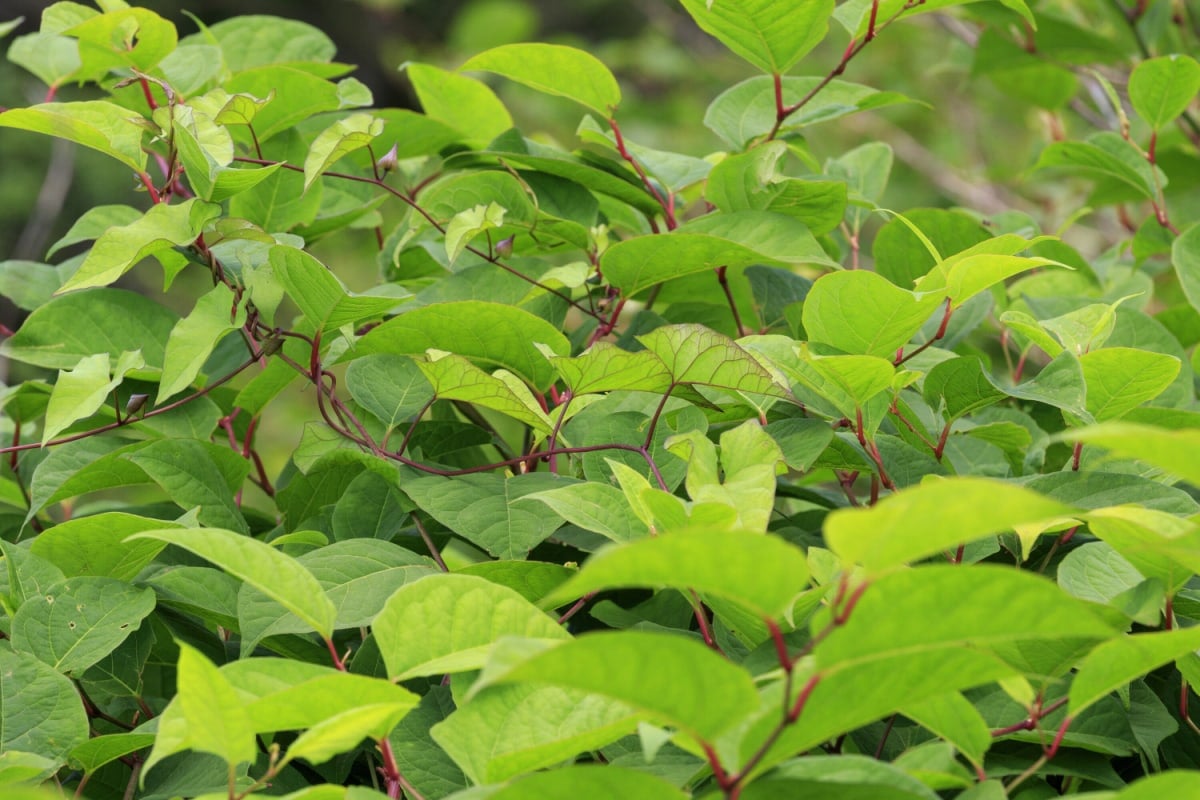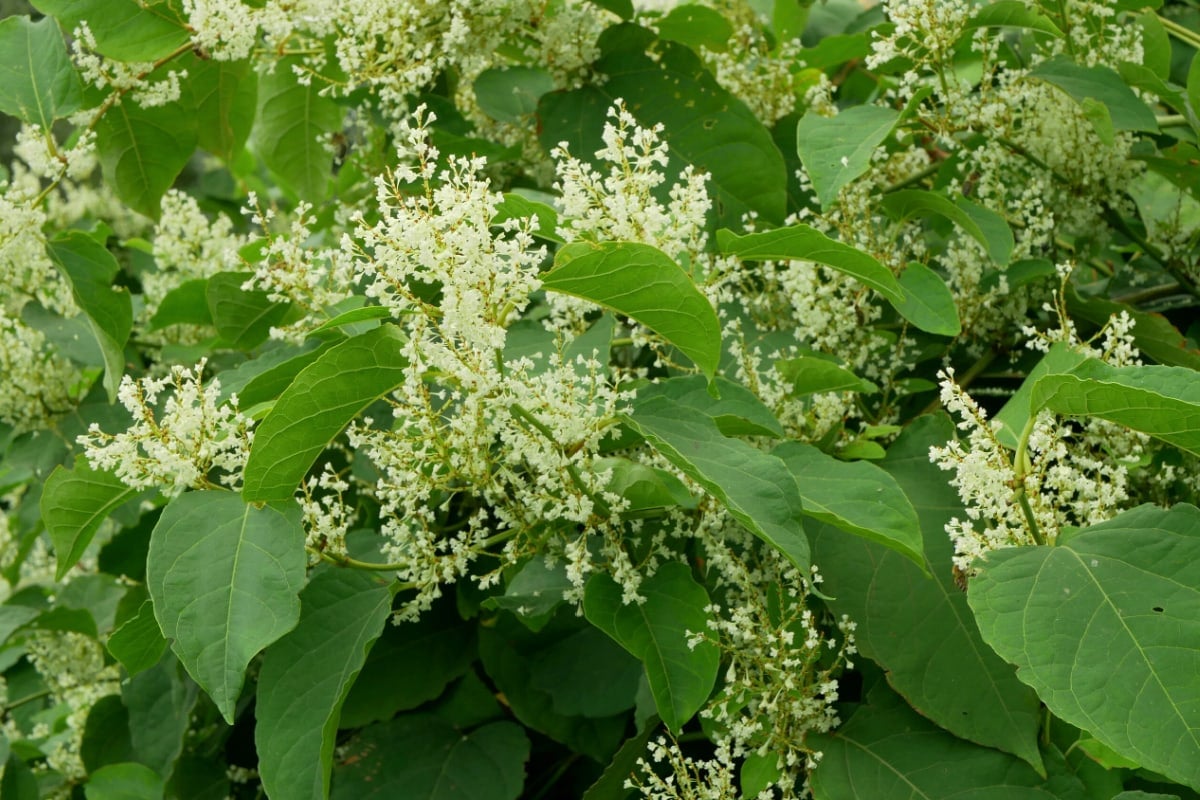Japanese Knotweed Benefits
Do you know about the amazing benefits of Japanese Knotweed? While this invasive plant is sometimes considered a nuisance, it can be beneficial in numerous ways.
Its mild flavor makes it an ideal ingredient for culinary dishes, and its long stalks are useful for crafting baskets and items used in construction.
Studies have also shown that the roots have medicinal properties that provide various health benefits, such as reduced inflammation, improved digestion, and even cancer prevention!
In this article, we’ll dive into everything there is to know about Japanese Knotweed and how it can be used to improve your life.
What is Japanese Knotweed?
Japanese Knotweed (Fallopia japonica) is an herbaceous perennial plant native to Japan, China, and Korea. It has been introduced to many countries as a garden ornamental and has become an invasive species in some areas.
The plant grows rapidly from rhizomes or underground stems, producing long arching stems with heart-shaped leaves and white flowers.
Nutritional Facts of Japanese Knotweed
- Japanese Knotweed is high in fiber, which can help keep your digestive system healthy and regular.
- It also contains several essential vitamins and minerals, such as magnesium, calcium, potassium, phosphorus, and iron.
- The plant is rich in antioxidants that can help reduce inflammation and free radical damage to the body’s cells.
- Japanese Knotweed is especially high in resveratrol, an important antioxidant that reduces cancer risks.
- The plant also contains Vitamin C, which helps protect against infection and promotes healthy tissue growth.
These nutritional benefits make Japanese Knotweed an ideal ingredient for nourishing and delicious meals!
Add it to soups, stir-fries, or salads and enjoy its delicious flavor and many health benefits. Its fiber content makes it a great snack between meals to keep you full longer.
What is in Japanese Knotweed?
Resveratrol
This compound is known for its antioxidant and anti-inflammatory properties. Studies have found that it can help protect cells from damage by free radicals, reduce inflammation, and improve vascular health.
Emodin
This compound is effective against bacterial infections, viruses, fungi, and parasites. It also helps modulate the immune system and has anti-cancer activity when taken in the right dose.
Berberine
Berberine is an alkaloid with antimicrobial properties that helps lower blood sugar levels. Additionally, studies suggest it may provide neuroprotective benefits and promote weight loss.
Triterpenoids
These compounds are derived from plants and have various therapeutic effects, including anti-inflammatory and immune-modulating properties. They can also help protect against cancer, liver disease, and bacterial infections.
Glycosides
These compounds benefit the heart, helping reduce cholesterol levels and prevent atherosclerosis. Additionally, they may help improve digestion and reduce inflammation.
Phenolic acids
These compounds are known for their antioxidant properties, which can help protect cells from damage by free radicals. Studies suggest these acids may also have anti-cancer activity and can even improve cognitive function!
Quercetin
This flavonoid is a powerful antioxidant with anti-inflammatory effects and potential benefits for cardiovascular health. Additionally, it may help lower blood pressure and reduce the risk of certain types of cancer.
Anthraquinones
These compounds are known for their laxative effects, but they have also been found to have anti-inflammatory and antimicrobial properties. Additionally, anthraquinones can be useful in treating skin conditions such as psoriasis.
Isoflavonoids
Isoflavonoids are a group of compounds found in plants that have numerous health benefits, including antioxidant, anti-inflammatory, and even anticancer activity. Additionally, these compounds may help improve cognitive function!
Stilbenes
Stilbenes benefit the heart and may help protect against cancer, inflammation, and neurological diseases. They can also boost immunity by modulating the body’s response to infection.
As you can see, Japanese Knotweed is a powerful plant with many compounds that provide numerous health benefits. Whether you want to improve your overall health or enjoy its culinary qualities, Japanese Knotweed is worth considering!
15 Health Benefits of Japanese Knotweed:
1. Reduced inflammation
This plant is known for its anti-inflammatory properties, which can help reduce pain and swelling.
2. Improved digestion
The compounds found in Japanese Knotweed can help improve digestion by stimulating the release of digestive enzymes.
3. Lowers cholesterol levels
Studies suggest a Japanese knotweed supplement may help lower cholesterol levels and prevent atherosclerosis.
4. Prevents cancer
The compounds found in this plant have been found to have anticancer activity, making it an effective way to protect against certain types of cancer.
5. Boosts immunity
Japanese Knotweed has antimicrobial and immune-modulating properties, which can help boost the body’s immune system and protect against infection.
6. Improves cognitive function
Taking a Japanese knotweed supplement may help improve memory, focus, and concentration.
7. Antioxidant properties
The compounds found in Japanese Knotweed are known for their antioxidant activity, which can help protect cells from damage by free radicals.
8. Helps with skin conditions
The anthraquinones found in Japanese Knotweed can be useful in treating skin conditions like psoriasis and eczema.
9. Improves cardiovascular health
Studies suggest a Japanese knotweed supplement may help reduce cholesterol levels and prevent atherosclerosis.
10. May help with weight loss
The berberine found in Japanese Knotweed may help reduce appetite and boost metabolism, making it an effective way to lose weight.
11. Anti-viral activity
Studies have found that the compounds found in this plant can be effective against viruses, helping to protect against infection.
12. Neuroprotective benefits
Berberine has been found to have neuroprotective benefits, which can help improve cognitive function and protect against neurological damage.
13. Antimicrobial properties
The emodin found in Japanese Knotweed has antimicrobial properties that can help fight bacterial infections, fungi, parasites, and viruses.
14. Improved vascular health
Resveratrol, one of the compounds found in this plant, has been shown to improve vascular health by reducing inflammation and helping to protect against damage caused by free radicals.
15. Liver protection
The triterpenoids found in Japanese Knotweed may help protect against liver disease and benefit people with existing liver conditions.
As you can see, Japanese Knotweed is an incredibly powerful plant with many health benefits. Whether you want to improve your overall health or enjoy its culinary qualities, this plant is worth considering!
Possible Side Effects of Japanese Knotweed:
1. Gastrointestinal distress
Japanese Knotweed can cause stomach pain, nausea, and vomiting due to its emodin content.
2. Skin irritation
The anthraquinones in the plant can cause an allergic reaction or skin irritation if consumed in large amounts or applied topically.
3. Liver damage
Excessive intake of Japanese Knotweed may lead to liver toxicity, as the liver metabolizes some of its compounds and can damage it if taken in too high of a dose.
4. Blood sugar fluctuations
Berberine, one of the compounds found in this plant, has been found to lower blood sugar levels which could lead to hypoglycemia if taken in too high of a dose.
5. Interactions with medications
Japanese Knotweed may interact with certain medications, so it is important to consult your doctor before taking any supplements containing this plant.
It’s important to note that while Japanese Knotweed has numerous health benefits, it can also have some side effects if not taken responsibly.
It is always best to consult a healthcare professional before starting any new supplement or medication regimen to avoid potential harm or interactions.
With the right precautions and doses, Japanese Knotweed can be used safely for its many health benefits!
Safety Tips for Using Japanese Knotweed
- It is important to wear protective gloves when handling Japanese Knotweed, as the plant’s sap can cause skin irritation in some people.
- Be sure to properly identify any wild plants before harvesting or consuming them — if you’re unsure, consult an expert!
- Ensure any harvested Japanese Knotweed has not been sprayed with herbicides or pesticides before cooking it.
- Avoid eating large amounts of raw Japanese Knotweed, as it can be somewhat toxic in its untreated form and may interfere with certain medications.
- If pregnant or breastfeeding, do not consume Japanese Knotweed without consulting your medical provider first!
By following these safety tips and understanding the amazing benefits of this powerful plant, you can use Japanese Knotweed to add flavor, nutrition, and variety to your meals!
FAQs:
Is Japanese knotweed good for health?
Yes! Japanese knotweed contains powerful antioxidants that have been found to reduce inflammation, improve digestion, and even help prevent certain types of cancer. Its roots can also be used in traditional Chinese medicine for various ailments.
Are there any risks associated with consuming Japanese knotweed?
Yes, consuming large amounts of Japanese knotweed may cause an upset stomach or skin reaction in some individuals. It is important to always consult with your doctor before taking any supplements or ingesting herbs like Japanese knotweed.
Additionally, it is best to avoid harvesting wild specimens growing on roadsides or other public areas due to their invasive nature.
Is Japanese knotweed an antibiotic?
No, Japanese knotweed is not an antibiotic. However, studies have shown that its roots possess antimicrobial properties that may help fight off infections and reduce inflammation.
Additionally, it has been used in traditional Chinese medicine to treat various ailments.
Is Japanese knotweed invasive?
Yes, Japanese knotweed is an extremely invasive plant. It can quickly overtake a garden or lawn and is difficult to remove due to its extensive root system. If you suspect this plant has invaded your yard, it is important to take immediate action to prevent further spread.
Who eats Japanese knotweed?
Japanese knotweed is widely eaten in Asia and is becoming increasingly popular in the West. Its mild flavor makes it an ideal ingredient for culinary dishes, while its long stalks are useful for crafting baskets and items used in construction.
Additionally, many people enjoy consuming Japanese knotweed due to its potential health benefits.
What are the benefits of eating Japanese knotweed?
Japanese knotweed has a mild flavor, making it an ideal ingredient for culinary dishes. Additionally, its long stalks are useful for crafting baskets and items used in construction. It is also packed with vitamins, minerals, and dietary fiber that can help promote overall health.
Lastly, studies have shown that consuming Japanese knotweed may help lower cholesterol levels and improve cardiac health.
Is Japanese knotweed good for the skin?
Yes, Japanese knotweed contains antioxidants that may help protect the skin from free radical damage and reduce inflammation.
Its antimicrobial properties also help fight off infections and clear up blemishes. Many people use it as a natural remedy for various skin conditions such as eczema and psoriasis.
Who should not take Japanese knotweed?
Anyone pregnant, breastfeeding, or taking any medication should always consult their doctor before ingesting Japanese knotweed. Additionally, it is best to avoid harvesting wild specimens growing on roadsides or other public areas due to their invasive nature.
Conclusion
As you can see, eating Japanese knotweed has many incredible benefits. It has a mild flavor, makes it great for culinary dishes, and its long stalks are also useful for crafting baskets and items used in construction.
Studies have shown that consuming this plant may provide numerous health benefits, such as reduced inflammation and improved digestion. So if you want to add some extra nutrition to your diet, consider trying Japanese knotweed!
Other related health articles:
- How to Eat More Vegetables
- Best Vegetables for Diabetics
- 10+ Best Immunity Boosting Vegetables
- How to Use Food as Medicine
- Vegetables With High Protein
- How Much Fiber Per Day?
- Foods for Glowing Skin
If you enjoyed this post about Japanese Knotweed and would love to see more, join me on Youtube, Instagram, Facebook & Twitter!
Get discounted copies of my cookbook here.
Fortunately, because of the ads on our website, readers and subscribers of Healthier Steps are sponsoring many underprivileged families.









